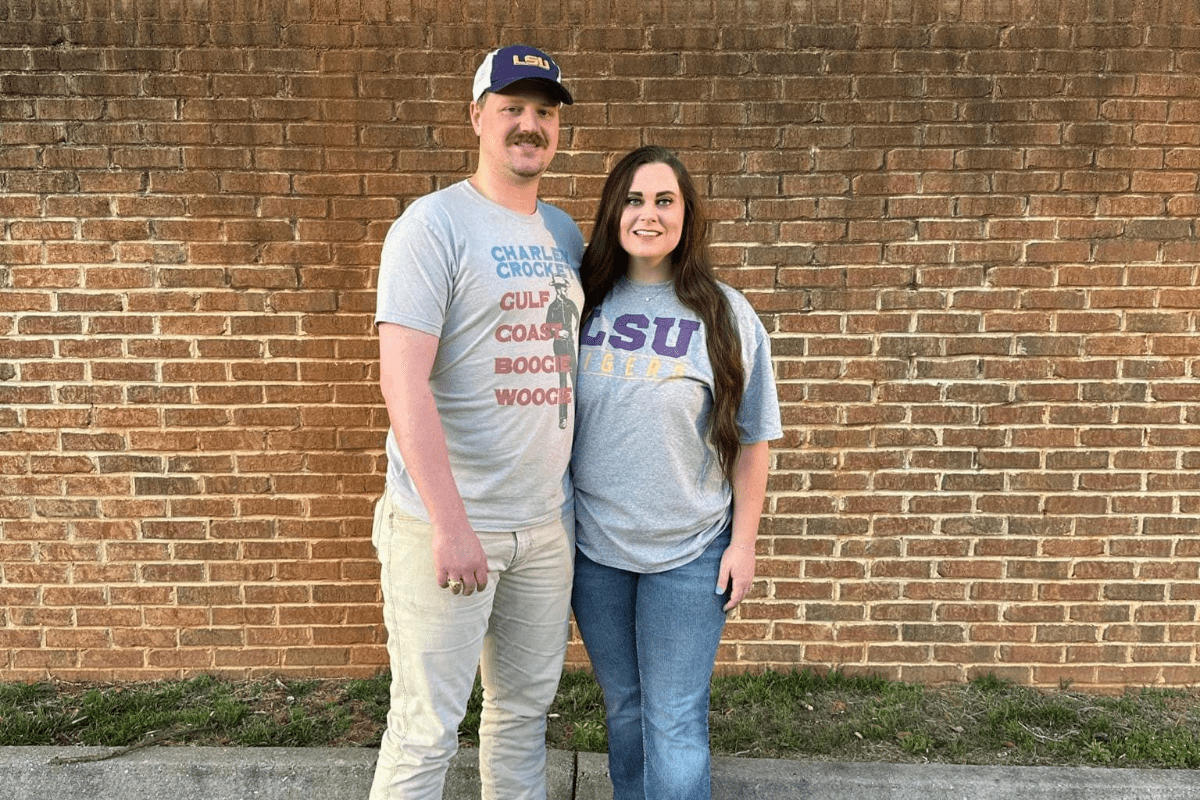
Dawson and Shelly Kerns were once two college graduates working at the same research center in West Tennessee. Years later, they would pursue advanced degrees in entomology and plant pathology at UT Knoxville, get married, and now work as assistant professors at the LSU AgCenter.
Dawson is originally from Texas and pursued his bachelor’s degree in entomology at Texas A&M. Shelly is from West Tennessee and earned her bachelor’s degree in crop and soil science at UT Martin. They met at the West Tennessee AgResearch and Education Center in Jackson in 2018 after completing their bachelor’s degrees.
“We really only knew each other when we started our master’s degrees,” said Shelly. This provided a solid foundation for a partnership throughout graduate school and in life.
When asked why they chose the Herbert College of Agriculture at UT Knoxville, they both said their choice was motivated by faculty. Dawson knew Scott Stewart, a research and extension field crops entomologist, prior to starting his master’s degree and had established a quality working relationship. Shelly interned with plant pathologist and professor Heather Kelly between her junior and senior year at UT Martin. When Kelly offered her a spot as a graduate student, it was a no-brainer.
After finishing their master’s degrees, Dawson and Shelly began to explore PhD programs. They applied to other programs at different universities, but agreed that UT Knoxville was the best option because of resources, career preparation, and diverse experiences.
As a master’s student, Shelly worked on a multi-state project that evaluated seed treatment efficacy against soil borne diseases in cotton. Dawson investigated bollworm behavior on genetically modified cotton that is protected against caterpillar pests by producing insecticidal proteins termed “Bt proteins”. They were able to further diversify their experiences by working on new projects for their PhD’s. Shelly investigated the influence of soil-borne fungi, plant-parasitic nematodes, and cultural practices on soybean yield potential and soil faunal communities. Dawson worked on understanding the molecular mechanisms of resistance to Bt proteins in bollworm, a caterpillar pest that has developed resistance to corn and cotton that produce Bt proteins.
Their hard work and experience paid off when they both accepted assistant professorships with the LSU AgCenter. Dawson interviewed for the field crops entomologist position because he was already familiar with the research station and was drawn to the opportunity to work with insects and cotton. In his role, Dawson works with clientele such as growers and crop consultants at figuring out complex problems by coming up with applicable solutions regarding insect pests of agronomic crops such as soybean, cotton, corn, and grain sorghum.
Coincidentally, there was also an open position for the statewide corn, cotton, and grain sorghum Extension specialist at the same research station at which Dawson had applied. Initially, Shelly was hesitant to apply because the job was very agronomy-focused. Now, she says she loves getting to do a little bit of everything and collaborate with Dawson, while also working on plant pathology related projects, which is her educational background.
As assistant professors at LSU, Dawson and Shelly also have several responsibilities in Extension and research. Shelly said it was actually Heather Kelly who made her want to stay involved in Extension. She loves meeting with clientele to discover what their interests and concerns are, which helps guide her Extension and research efforts. She also enjoys impacting youth by making educational experiences more accessible.
Dawson and Shelly have several people to thank for getting them to where they are today. Along with Scott Stewart’s mentorship and training on how to engage with clientele, Dawson credits his PhD advisor, Juan Luis Jurat-Fuentes, professor in entomology, for honing his skills as a scientist and teaching him how to collaborate with other scientists from around the world. He said, “If there’s a research question I can’t answer, I know who to reach out to!”
Shelly described Heather Kelly as a “phenomenal advisor.” She continued, “She wants students to be successful in their program and in their careers.” As a first-generation college student, Shelly often felt like she didn’t belong, but Kelly always made her feel seen and listened to her ideas. Through her time at UT Knoxville, she felt “less stressful and more successful” because of the community of faculty and student culture within the entomology and plant pathology department.
Shelly expressed, “The people at Herbert and UTIA are just really great in general. They truly want students to succeed outside of graduate school.” Dawson and Shelly’s journeys from UT Knoxville to the LSU AgCenter are evidence of this.
